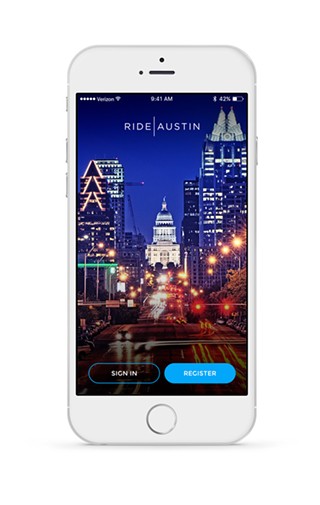Another new player gets set to enter the Austin rideshare market.
Adding to the growing number of ride-hailing options in Austin since Uber and Lyft’s wholesale evacuation, a new nonprofit, community-based app called RideAustin was introduced today at the Alamo Drafthouse on South Lamar.
The app is being described as “innovative,” as well as made “by Austin, for Austin,” according to Joe Deshotel, RideAustin’s PR representative.
The initiative is a collaboration of Austin-based tech entrepreneurs and community leaders, for service that “[brings] the community together to build local solutions for Austin’s ridesharing future.” Formed as a nonprofit, and led by billionaire Austin tech giant and Trilogy founder Joe Liemandt and Crossover founder Andy Tryba, RideAustin’s overarching goal to become a “community asset,” per Deshotel, begins with uniting tech advancement with social responsibility.
Only two weeks in the making – Deshotel himself joined the group a week ago – the app joins Get Me, zTrip, Wingz, and still-in-the-works Warp Ridesharing. The RideAustin app will go live for iPhone users this morning, with service starting in June. (The Android version of the app is also expected to roll out in June.) Prospective drivers can start the on-boarding process, and get themselves scheduled for fingerprinting.
Blue-sky success would involve a smooth scale out from its initial services areas: the Austin-Bergstrom International Airport and the Downtown area, for which exact parameters haven’t been set. Not having “to worry about shareholders” as a nonprofit, it “will allow drivers to earn more [RideAustin will take a smaller than industry-standard commission] and riders pay less while helping local charities.”
Initial ride pricing itself is unknown, but unlikely to be as low as Uber and Lyft, at least to start. As reported previously, the best current option, Get Me, has been struggling with driver/rider matches, often forcing riders to wait longer than 10 minutes – Uber took an average of three minutes – and pay significantly higher prices.
Two unique RideAustin app features include a fare roundup option and “optional surge pricing,” says Deshotel. The fare roundup feature would allow riders round their fares up to the next dollar over the fare, to be given to a choice of as-yet-determined charities.
The more interesting (and potentially problematic) feature, optional surge pricing, would allow riders to opt-in to surges, allowing them first ride at premium cost. Riders electing not to opt-in, or financially unable to do so, will remain in driver queues, placed behind those accepting surge pricing. Though RideAustin is surely a business in all contexts, even with its additional aims at targeting the underserved and disabled, locating balance will be paramount, and could throw its first-look presentation as community-facing into immediate question.
Having this be a nonprofit is an interesting variation, and while I’m not exactly sure how well that will work, I see no reason why it can’t work. The point is that we should all hope that at least a couple of these new ventures find success, which they are then able to bring to other cities. I’ve heard an awful lot about the “free market” in ridesharing over the past several months, but the truth is that the rideshare market was and currently is entirely dominated by two enormous firms. That’s a “competitive” market in the same way that the broadband and cable/satellite TV markets are competitive. Surely that’s not what we really want here, right? I’ll say again, the single best outcome here is for multiple viable alternatives to Uber and Lyft to emerge. That would be good for riders, good for drivers, and good for city governments that don’t want to be held hostage by a couple of would-be monopolists. The Statesman and Buzzfeed have more.


Thanks for the coverage! I really hope Houston is watching. 🙂
So, are the drivers for the new non profit service going to be fingerprinted? That seemed to be the issue that caused Uber and Lyft to take their marbles and go home.